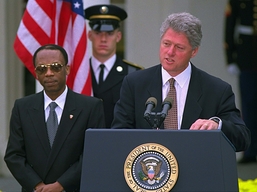.
Port-au-Prince, Haiti (CNN) — France’s President Nicolas Sarkozy made a landmark visit to Haiti, announcing more than $100 million of additional aid to the former French colony where 212,000 people were killed by an earthquake five weeks ago.
Sarkozy is the first French president ever to visit the country which has in the past demanded huge reparations from France to compensate for slavery-era exploitation before Haitian independence two centuries ago
…
France has had close cultural ties with its former colony since independence, but diplomatic relations have sometimes been fraught, with Paris occasionally expressing concerns over instability in the Caribbean nation.
In 2004, France called for the resignation of then president Jean Bertrand Arstide , who was subsequently ousted in a 2004 rebellion, after his government demanded that France pay $21 billion in reparations.
Read on for a bit true historic perspective …
ANALYSIS: Slavery, international extortion, embargoes and dictatorships have eroded Haiti’s ability to deal with its awful death toll and destruction.
The indigenous Taíno Indian population became virtually extinct under early Spanish colonial rulers, who imported African slaves to exploit the island for its minerals. In 1697, France and Spain divided the island between them, France taking the western third – what is now Haiti – and bringing hundreds of thousands more colonists from Europe.
When the Caribbean nation gained its independence in 1804, France – with the support of the United States, Britain and Spain – imposed an embargo and refused to lift it until Haiti paid an indemnity for lost property: in other words, for its slaves. Haiti agreed to pay the 90 million francs, but bitterness over the deal persists to this day.
- In 1825, crippled by the US-led international embargo that was enforced by French warships, Haiti agreed to pay France 150 million francs in compensation for the lost “property” — including slaves — of French plantation owners.
By comparison, France sold the United States its immensely larger Louisiana Territory in 1803 for just 60 million francs. The amount for Haiti was later lowered to 90 million gold francs.
Haiti did not finish paying the debilitating debt — which was swollen by massive interest payments to French and American banks — until 1947.

Jean-Bertrand Aristide with Bill Clinton in 1994 (AP Photo/Ron Edmonds)
In 1994, then Haitian president Jean-Bertrand Aristide called on France to pay reparations of $21 billion, the modern equivalent of the fee his country paid 200 years earlier. Foreign intervention did not end with the departure of the French, however: the United States occupied the island from 1915 to 1934.
In recent decades, Haiti has endured persistent political upheaval. It became notorious for the brutal dictatorships of Francois “Papa Doc” Duvalier, who seized power in 1957, and his son Jean-Claude, or “Baby Doc”, who was forced into exile in 1986.
Four years later, the populist priest Jean-Bertrand Aristide was the landslide winner of a presidential election – Haiti’s first free and peaceful election – but hopes of democratic renewal were dashed when he was overthrown by the military within a year.
"But I will not let myself be reduced to silence."




